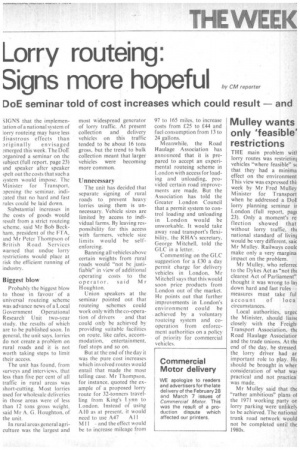Lorry routeing:
Page 21

If you've noticed an error in this article please click here to report it so we can fix it.
Signs more hopeful by CM reporter
DoE seminar told of cost increases which could result — and
SIGNS that the implementation of a national system of lorry routeing may have less disastrous effects than ariginally envisaged ..merged this week. The DoE arganized a seminar on the iubject (full report, page 23) and speaker after speaker ;pelt out the costs that such a iystern would impose. The Minister for Transport, ,Ipening the seminar, indiatecl that no hard and fast rules could be laid down.
Substantial increases in the costs of goods .would result from a strict routeing -echeme, Said M r Bob Beckham, president of the FTA, and Mr Peter Thompson of British Road Services warned that undue lorry restrictions would place at risk the efficient running of industry.
Biggest blow
Probably the biggest blow to those in favour of a universal routeing scheme was advance news of a Local Government Operational Research. Unit two-year study. the results of which are to be published soon. In general, the unit says. lorries Jo not create a problem on rural roads and it is not worth taking steps to limit their access.
The unit has found, from urveys and interviews, that less than five per cent of all traffic in rural areas was hort-cutting. Most lorries used for wholesale deliveries in those areas were of less than 12 tons gross weight, said Mr A. G. Houghton, of the unit.
in rural areas general agriculture was the largest and most widespread generator of lorry traffic. At present collection and delivery vehicles on this traffic tended to he about 16 tons gross, hut the trend to bulk collection meant that larger vehicles were becoming more common.
Unnecessary
The unit has decided that separate signing of rural roads to prevent heavy lorries using them is unnecessary. Vehicle sizes are limited by access to individual farms. By leaving responsibility for this access with farmers, vehicle size limits would be selfenforcing.
Banning all vehicles above certain weights from rural roads would "not be justifiable" in view of additional operating costs to the operator, said Mr Houghton.
Union speakers at the seminar pointed out that routeing schemes could work only with the co-opera tion of drivers and that could only be achieved by providing suitable facilities on route. like cafes, accommodation, . entertainment, fuel stops and so on.
But at the end of the day it was the pure cost increases which involved routes would entail that made the most telling case. Mr Thompson, for instance, quoted the example of a proposed lorry route for 32-tonners travelling from King's I.ynn to London. Instead of using Al0 as at present, it would need to use A47 All M11 and the effect would he to increase mileage from 97 to 165 miles, to increase costs from £25 to £44 and fuel consumption from 13 to 24 gallons.
Meanwhile, the Road Haulage Association has announced that it is prepared to accept an experimental routeing scheme in London with access for loading and unloading, provided certain road improvements are made. But the Association has told the Greater London Council that a permit system to control loading and unloading in London would be unworkable. It would take away road transport's flexibility, the RHA's secretary, George Mitchel!, told the GLC in a letter.
Commenting on the GLC suggestion for a £30 a day permit charge for delivery vehicles in London, Mr Mitchell says that this would soon price products from London out of the market. He points out that further improvements in London's environment could be achieved by a voluntary routeing system and cooperation from enforcement authorities on a policy of priority for commercial vehicles.












































































































































































